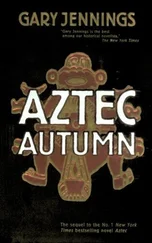Gary Jennings - Aztec
Здесь есть возможность читать онлайн «Gary Jennings - Aztec» весь текст электронной книги совершенно бесплатно (целиком полную версию без сокращений). В некоторых случаях можно слушать аудио, скачать через торрент в формате fb2 и присутствует краткое содержание. Жанр: Старинная литература, на английском языке. Описание произведения, (предисловие) а так же отзывы посетителей доступны на портале библиотеки ЛибКат.
- Название:Aztec
- Автор:
- Жанр:
- Год:неизвестен
- ISBN:нет данных
- Рейтинг книги:4 / 5. Голосов: 1
-
Избранное:Добавить в избранное
- Отзывы:
-
Ваша оценка:
- 80
- 1
- 2
- 3
- 4
- 5
Aztec: краткое содержание, описание и аннотация
Предлагаем к чтению аннотацию, описание, краткое содержание или предисловие (зависит от того, что написал сам автор книги «Aztec»). Если вы не нашли необходимую информацию о книге — напишите в комментариях, мы постараемся отыскать её.
"Anyone who reads, anyone who still lusts for adventure or that book you can't put down, will glory in Aztec."--Los Angeles Times
Aztec
Aztec
Aztec — читать онлайн бесплатно полную книгу (весь текст) целиком
Ниже представлен текст книги, разбитый по страницам. Система сохранения места последней прочитанной страницы, позволяет с удобством читать онлайн бесплатно книгу «Aztec», без необходимости каждый раз заново искать на чём Вы остановились. Поставьте закладку, и сможете в любой момент перейти на страницу, на которой закончили чтение.
Интервал:
Закладка:
Of course, the first things attended to were those most important. The broken aqueducts were repaired, and then the foundations were laid for what would be your cathedral church, while directly in front of it were erected the pillory and the gallows. Those were the first functioning structures in the new City of Mexíco, for they were much exercised to inspire us to unceasing and conscientious labor. Those who slacked at any job were strangled on the gallows, or were branded with the "prisoner of war" mark on the cheek and then were exposed in the pillory for the outlanders to pelt with stones and horse droppings, or they were broken by the whips of the overseers. But those who worked hard died almost as frequently as did the slackers, from such causes as being forced to lift a stone so heavy that they ruptured their insides.
I was far more fortunate then most, for Cortés gave me employment as an interpreter. With all the orders and instructions to be relayed from architects to builders, with all the new laws and proclamations and edicts and sermons to be translated to the people, there was more work than Malintzin alone could manage, and the man Aguilar, who might have assisted to some degree, had long ago died in a battle somewhere. So Cortés engaged me, and even paid me a small wage in Spanish coin, in addition to giving me and Béu accommodation in the splendid residence—what had once been Motecuzóma's country palace near Quaunahuac—which he had appropriated for himself and Malintzin and his ranking officers and their concubines, and where he also kept under his eye Cuautemoc and his family and courtiers.
Perhaps I should apologize, though I do not know to whom, that I took employment with the white men, rather than die defying them. But, since the battles were all over, and I had not perished in the struggle, it seemed my tonáli ordained that for at least a while longer I should struggle not to perish. I had once been bidden, "Stand! Endure! Remember!" and that was what I determined to do.
For some time, a major part of my interpreting duties consisted in my translating Cortés's incessant and insistent demands to know what had become of the Mexíca's vanished treasury. If I had been a younger man, and able to work at any other trade that would have supported myself and my ever-ailing wife, I would right then have quit that degrading occupation. It required me to sit with Cortés and his officers, as if I were one of them, while they bullied and insulted my fellow lords, calling them "damned, lying, greedy, treacherous, clutching Indians!" I was especially ashamed of myself when I had to participate in the repeated interrogations of the Uey-Tlatoani Cuautemoc, whom Cortés no longer addressed with unction or even the least respect. To Cortés's reiterated queries, Cuautemoc could or would say nothing but a disclaimer:
"To the best of my knowledge, Captain-General, my predecessor Cuitlahuac left the treasure in the lake where you threw it."
At which, Cortés would snarl, "I have sent down my best swimmers and yours. They find nothing but mud!"
And Cuautemoc could or would make only the rejoinder, "The mud is soft. Your cannons made the whole Lake Texcóco tremble. Any objects as heavy as gold would have settled ever deeper in that ooze."
I felt most ashamed on the day I had to watch the "persuasion" of Cuautemoc and the two old men of his Speaking Council who had accompanied him to that session of questioning. After I had many times translated those same words so many times exchanged before, Cortés exploded in a temper. He ordered his soldiers to rake from the palace kitchen's hearth three large bowls of embers, and made the three lords of the Mexíca sit with their bare feet in those smoldering coals while he again asked the identical questions and they, gritting their teeth against the pain, gave the identical replies. At last, Cortés threw up his hands in a gesture of disgust and stalked out of the room. The three cautiously stood up from their chairs and stepped out of the bowls and began gingerly to make their way to their quarters. The two old men and the younger one, doing their best to support each other, hobbled on their blistered and blackened feet, and I heard one of the elders moan:
"Ayya, Lord Speaker, why do you not tell them something else? Anything? I hurt unbearably!"
"Be silent!" snapped Cuautemoc. "Do you think I am this moment walking in a pleasure garden?"
Though I loathed Cortés and myself and our association, I refrained from any deed or remark that might arouse his displeasure and endanger my soft situation, because, within a year or two, there were many of my fellows who would happily have replaced me as Cortés's collaborator, and could adequately have done so. More and more of the Mexíca and other peoples—of nations both inside and outside The Triple Alliance—were hastening to learn Spanish and to apply for baptism as Christians. They did it not so much from servility as from ambition, and even necessity. Cortés had early promulgated a law that no "Indian" could hold any position higher than that of common laborer until and unless he was a confirmed Christian and proficient in the conquerors' spoken tongue.
I was already recognized by the Spaniards as Don Juan Damasceno, and Malintzin was Doña Marina, and the other Spaniards' concubines were Doña Luisa and Doña Maria Immaculada and the like, and some few nobles succumbed to the temptation of the advantages of being Christian and speaking Spanish; the former Snake Woman, for instance, became Don Juan Tlacotl Velasquez. But, as might have been expected, most others of the onetime pípiltin, from Cuautemoc on down, disdained the white men's religion and language and appellations. However admirable their stand, it proved to be a mistake, for it left them nothing but their pride. It was the people of the lowest classes, and the lowest-born of the middle classes, and even slaves of the nethermost tlacotli class, who did besiege the chaplains and the missionary friars for instruction in Christianity, and for baptism with Spanish names. It was they who, to learn the Spanish tongue, eagerly gave their own sisters and daughters in payment to the Spanish soldiers who had enough education and intelligence to teach it.
Thus it was the mediocrities and dregs of society who, having no inborn pride to discard, freed themselves of the drudge work and got themselves put in charge of the drudges—who in an earlier day had been their superiors, their leaders, even their owners. Those upstart "imitation whites," as others of us called them, eventually were given posts in the increasingly complex government of the city, and were made the chiefs of outlying towns, even of several negligible provinces. It might have been regarded as praiseworthy: that a nobody could uplift himself to eminence; except that I cannot recall a single one who utilized his eminence for the good of anyone but himself.
Such a man was suddenly superior to all who had been his superiors and equals, and that was as high as his ambition reached. Whether he achieved the post of provincial governor or merely that of timekeeper at some building project, he became a despot over everyone under him. The timekeeper could denounce as a trifler or drunkard any workman who did not fawn on him and bribe him with gifts. He could condemn that workman to anything from a cheek brand to a hanging on the gallows. The governor could debase onetime lords and ladies to garbage collectors and street sweepers, while he forced their daughters to submit to what you Spaniards call "the rights of the señorio." However, I must in fairness say that the new nobility of Spanish-speaking Christians behaved equally toward all their countrymen. As they humiliated and tormented the formerly highest classes, so did they similarly mistreat the lower classes from which they themselves had sprung. They made everybody—except their own appointed superiors, of course—far more miserable than any meanest slave had been in years gone by. And, while the total reversal of society did not physically affect me, I was troubled by my realization that, as I told Béu, "These imitation whites are the people who will write our history!"
Читать дальшеИнтервал:
Закладка:
Похожие книги на «Aztec»
Представляем Вашему вниманию похожие книги на «Aztec» списком для выбора. Мы отобрали схожую по названию и смыслу литературу в надежде предоставить читателям больше вариантов отыскать новые, интересные, ещё непрочитанные произведения.
Обсуждение, отзывы о книге «Aztec» и просто собственные мнения читателей. Оставьте ваши комментарии, напишите, что Вы думаете о произведении, его смысле или главных героях. Укажите что конкретно понравилось, а что нет, и почему Вы так считаете.











